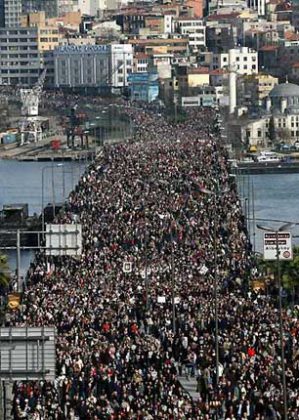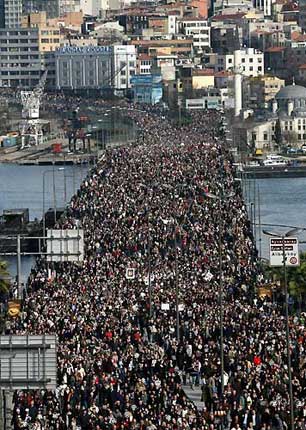
 A Pastoral Letter from His Eminence Archbishop Khajag Barsamian
A Pastoral Letter from His Eminence Archbishop Khajag Barsamian Primate of the Eastern Diocese of the Armenian Church of America
26 January 2007
To The Reverend Clergy and My Brothers and Sisters of the Armenian Church as Well as All Men and Women of Good Will, Everywhere,
In the name of our Lord, Jesus Christ, I give you my prayers and join with you in your own prayers for the repose of the soul of our beloved friend Hrant Dink, a faithful and devoted son of the Armenian Church.
Preface
1. The brutal assassination of journalist Hrant Dink has brought great pain and suffering to many people, the least of not whom are his family and the Armenian community of which he was a faithful son. His murder went beyond a senseless act of crime, though it was that, because he had taken up the cause of truth and hope that the reconciliation of the Turkish and Armenian peoples was possible.
2. It is necessary, therefore, that we who mourn his death, be they Armenian or even Turkish, do so in a manner that not only pays tribute to the man and his work, but concurrently promotes that possibility that in death his dream of the reconciliation of men and women can be achieved through peaceful and constructive dialogue.
3. We must be cognizant that there are well intentioned people who, in the grief and despair of the moment may, with the best of intentions, speak out in anger in ways disruptive to goals Hrant Dink championed and to which we are committed as Christians. For that reason I urge every man and woman to seek guidance and comfort from their pain through prayer and reflection so that we can be true to ourselves, worthy to be counted amongst the supporters of constructive dialogue and peace.
4. It is also my concern that we not be afraid to vigorously speak the truth while at the same time seeking to proclaim it in constructive ways. We cannot help but be fully cognizant that there existed an environment which twisted a child, born in God?s image, into an agent of hate so vile that he would murder another human being solely because of his advocacy of truth, justice, peace and understanding. Likewise, we must be equally aware that within this same said environment people of good will were nurtured, wholly capable of embracing their national and cultural affinities while simultaneously joining Hrant Dink in his disdain for unjust laws, the proscription of free speech and the perpetuation of the un-dignified manner in which minorities were treated in their homeland.
Introductory Statement Concerning the Life of Hrant Dink
Hrant Dink was a noble person who committed himself to dialogue and peace. Born in Malatya and along with his two siblings, Hrant was raised in the Armenian Orphanage in Gedikpasa, Istanbul from the age of seven. He spent his life in Turkey. But he never forgot that he was an Armenian, culturally, ethnically and in his faith. Still, he did not once think of himself as disloyal to Turkey. Indeed, he served honorably with the Turkish Naval Infantry Regiment in Denizli.
Hrant Dink never believed that it was disloyal to speak the truth. Indeed, he believed that it was his, and every Turkish citizen?s duty to seek out and speak the truth. He believed that Turkey, being bound by a past too unbearable to even speak, held his country in bondage. So, with a clear conscience, a good heart and a talent for writing, Hrant and his colleagues founded Agos, a bilingual Turkish-Armenian newspaper dedicated to responsible journalism and advocacy for peaceful change and dialogue.
Hrant was not alone in thinking that the pursuit of historic truths and responsible journalism were not crimes. Unfortunately, there were those who disagreed and, in 2005, he was charged with the crime of violating Article 301 of the Turkish legal code. Sadly, despite international outcries, he was convicted. Now, only months since that event, he was gunned down by a radical youth, who was no doubt encouraged by an environment of contempt for free speech, civil rights and human dignity so strong that it has been codified into law.
In the aftermath of this heroic journalist?s assassination we have witnessed the confluence of currents as strong as those of the Bosporus. There are those who would usurp Hrant?s name and ideas as a means of quashing Turkey?s desire in joining the European Union. Others have perverted his life?s work of promoting peace, understanding, dialogue and reconciliation by reacting out of anger, and understandable anger, but still a destructive one.
In the aftermath of this heroic journalist?s assassination we have witnessed the confluence of currents as strong as those of the Bosporus. There are those who would usurp Hrant?s name and ideas as a means of quashing Turkey?s desire in joining the European Union. Others have perverted his life?s work of promoting peace, understanding, dialogue and reconciliation by reacting out of anger, and understandable anger, but still a destructive one.
Still, I have been encouraged by the vast majority of people?s reactions to this tragic event. First, in their personal outpouring of love and sympathy for Hrant?s wife Rakel, and her children with whom I met on a pastoral visit for His Holiness Karekin II, Supreme Patriarch and Catholicos of All Armenians, whom I represented in Istanbul at Hrant?s funeral. Second, I have personally witnessed the solidarity with Hrant?s ideas and dreams demonstrated by well over 100,000 people who lined the streets of Istanbul as the funeral cortege passed by, as well as those who flocked to his graveside to pay their respects. These were not the passing whims of sympathy for a victim of a crime as some would report, but the earnest, sincere and heartfelt expressions of love and commitment to Hrant?s life?s work by people who have silently shared his struggle and who now proclaim their solidarity loudly, vocally and explicitly for the world to see.
At times of sorrow it is customary for people to make polite gestures of respect. My brothers and sisters, I do not believe that this was the case with Hrant?s death. Signs emblazoned with the words ?I am Hrant Dink? and even ?I am Armenian Too,? held high, and proudly, were not held by Armenians alone. The majority of mourners who made these statements and held these signs in Istanbul were Turkish men and women.
And these mourners who paid tribute to the memory of Hrant Dink were not just politicians who hoped to gain public favor, or intellectuals who sought to preserve and promote the rights of freedom of speech and publication alone. Tens of thousands of these mourners were ordinary, working class, Turkish men and women who felt sharply the loss of an eloquent and talented advocate of truth. After all, truth does not belong to one people, or a single person, but is the rightful property of all people, everywhere. Not surprisingly, many Turkish people feel that the murder of Hrant Dink was a severe blow to them too.
A Call to Reason, Love and Reconciliation
I have observed that even in the blackest of nights there are stars capable of shining so brightly that they pierce the darkness until such time they are joined with the rising of the new day where Light reigns supremely. So it is too with our human history. This has seemed especially so for our beloved Armenian people. Yet it is not the will of our Loving God that any man or woman, or the Armenian people, suffer needlessly. But sadly, we know that suffering is part of the human condition that shall continue from time to time until He comes again in Glory to redeem His people.
What we do with suffering says much about who we are. We must, each one of us, Christian and non-Christian, Armenian, Turk and other peoples of the world, not allow suffering to reign supreme and subdue our reason and better selves. We must strive to make use of our sense of loss and suffering and in so doing, find what redemption we can, even after such an evil event.
If we have the courage to convert our anger to action, our pity to passion, and sorrow to salvation we can best pay tribute to the causes of truth, dialogue and reconciliation, we can make what was Hrant Dink?s work in life ours in the wake of his death. Then we too might rightfully lay claim to the cries, ?I am Armenian Too? and ?I am Hrant Dink.?
While the plan which Providence unveils to us one day at a time might at times defy our ability to make sense out of life?s journey we should make no mistake that we know God?s plan for us which is the love, peace, sense of generosity and a thirst for the reconciliation of men and women the world over which was indelibly etched into our souls at baptism, reinforced in chrismation and fostered each week in our celebration and partaking in the Eucharist – the Bread of life.
Our Commission as Lovers of Truth and Servants of God
During these forty days of prayers for the repose of the soul of Hrant Dink I urge you to re-read his writings. If you have not read them personally, seek them out. Discover what this man of peace desired and how he thought it might be best achieved. Never lose sight of the truth, but consider how it might best be proclaimed so that ears that have been closed might be opened anew. And as always, determine how you, a person of God, might join in that struggle that ended his life, but must and cannot be allowed to kill his dreams and hopes.
Go, therefore, converting all nations, proclaiming the Good News, reconciling ourselves and humanity to the truth, so that we, from whatever nation we were born, can call ourselves Children of God, recommitted to loving our neighbor as ourselves.
With prayers,
Archbishop Khajag Barsamian
Primate
Archbishop Khajag Barsamian
Primate
Diocese of the Armenian Church of America (Eastern)
www.armenianchurch.net
www.armenianchurch.net
Photo: Hrant Dink's funeral in Istanbul on 23 January 2007
